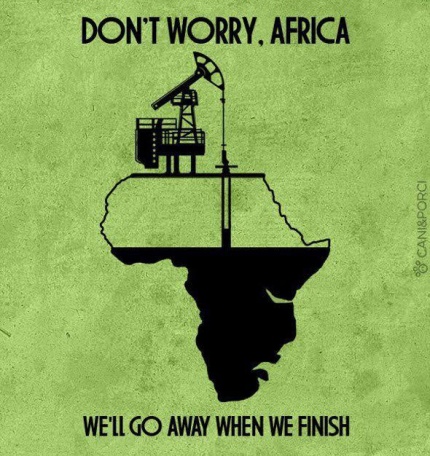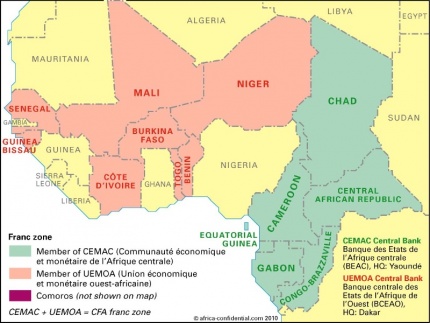How France lives off Africa with the Colonial Pact

The below is a summary of an article I came across via friends & Siji Jabbar. It is in the February issue of the New African (and draws on an interview given by Professor Mamadou Koulibaly, Speaker of the Ivorian National Assembly, Professor of Economics, and author of the book The Servitude of the Colonial Pact). Here is how Jabbar frames the argument: “Just before France conceded to African demands for independence in the 1960s, it carefully organized its former colonies (CFA countries) in a system of “compulsory solidarity” which consisted of obliging the 14 African states to put 65% of their foreign currency reserves into the French Treasury, plus another 20% for financial liabilities. This means these 14 African countries only ever have access to 15% of their own money! If they need more they have to borrow their own money from the French at commercial rates! And this has been the case since the 1960s.” We hope they won’t mind me too sharing it with you influx, so here goes:
THE COLONIAL PACT
It is the Colonial Pact that set up the common currency for the Francophone countries, the CFA Franc, which demands that each of the 14 C.F.A member countries must deposit 65% (plus another 20% for financial liabilities, making the dizzying total of 85%) of their foreign exchange reserves in an “Operations Account” at the French Treasury in Paris.
The African nations therefore have only access to 15% of their own money for national development in any given year. If they are in need of extra money, as they always are, they have to borrow from their own 65% in the French Treasury at commercial rates. And that is not all: there is a cap on the credit extended to each member country equivalent to 20% of their public revenue in the preceding year. So if the countries need to borrow more than 20%, too bad; they cannot do it. Amazingly, the final say on the C.F.A arrangements belongs to the French Treasury, which invests the African countries’ money in its own name on the Paris Bourse (the stock exchange).
It is also the Colonial Pact that demands that France has the first right to buy or reject any natural resources found in the land of the Francophone countries. So even if the African countries could get better prices elsewhere, they cannot sell to anybody until France says it does not want to buy those natural resources.
It is, again, the Colonial Pact that demands that in the award of government contracts in the African countries, French companies should be considered first; only after that can Africans look elsewhere. It doesn’t matter if Africans can obtain better value for money elsewhere, French companies come first, and most often get the contracts. Currently, there is the awkward case in Abidjan where, before the elections, former president Gbagbo’s government wanted to build a third major bridge to link the central business district (called Plateau) to the rest of the city, from which it is separated by a lagoon. By Colonial Pact tradition, the contract must go to a French company, which incidentally has quoted an astronomical price – to be paid in euros or US dollars.
Not happy, Gbagbo’s government sought a second quote from the Chinese, who offered to build the bridge at half the price quoted by the French company, and – wait for this – payment would be in cocoa beans, of which Cote d’Ivoire is the world’s largest producer. But, unsurprisingly, the French said “non, you can’t do that”.
Overall the Colonial Pact gives the French a dominant and privileged position over Francophone Africa, but in Côte d’Ivoire, the jewel of the former French possessions in Africa, the French are overly dominant. Outside parliament, almost all the major utilities – water, electricity, telephone, transport, ports and major banks – are run by French companies or French interests. The same story is found in commerce, construction, and agriculture.
In short, the Colonial Pact has created a legal mechanism under which France obtains a special place in the political and economic life of its former colonies.
In what meaningful way can any of the 14 CFA countries be said to be independent?
If this isn’t illegal and an international crime, then what is?
What is it going to take for this state of indentured servitude to end?
How much have the CFA countries lost as a result of this 50-year (and counting) “agreement”? (Remember, they’ve had to borrow their own money from the French at commercial rates)
Do French people know they’re living off the wealth of African countries and have been doing so for over half a century? And if they know, do they give a damn?
When will France start paying back money they’ve sucked from these countries, not only directly from the interest on cash reserves and loans these countries have had to take out, but also on lost earnings from the natural resources the countries sold to France below market rates as well as the lost earnings resulting from awarding contracts to French companies when other contractors could have done things for less?
Does any such “agreement” exist between Britain and its former colonies, or did they really let go when they let go?
PLEASE READ
The economic and political effects of the CFA zone
The Servitude of the Colonial Pact (Interview with Professor Mamadou Koulibaly)
The CFA franc still controlled by Paris
Mamadou Koulibaly launches a African crusade
Good that Ouattara is the Cote d’Ivoire President but what about the Colonial Pact?


 Poasis II: Selected Poems 2000-2024
Poasis II: Selected Poems 2000-2024 “Todesguge/Deathfugue”
“Todesguge/Deathfugue” “Interglacial Narrows (Poems 1915-2021)”
“Interglacial Narrows (Poems 1915-2021)” “Always the Many, Never the One: Conversations In-between, with Florent Toniello”
“Always the Many, Never the One: Conversations In-between, with Florent Toniello” “Conversations in the Pyrenees”
“Conversations in the Pyrenees” “A Voice Full of Cities: The Collected Essays of Robert Kelly.” Edited by Pierre Joris & Peter Cockelbergh
“A Voice Full of Cities: The Collected Essays of Robert Kelly.” Edited by Pierre Joris & Peter Cockelbergh “An American Suite” (Poems) —Inpatient Press
“An American Suite” (Poems) —Inpatient Press “Arabia (not so) Deserta” : Essays on Maghrebi & Mashreqi Writing & Culture
“Arabia (not so) Deserta” : Essays on Maghrebi & Mashreqi Writing & Culture “Barzakh” (Poems 2000-2012)
“Barzakh” (Poems 2000-2012) “Fox-trails, -tales & -trots”
“Fox-trails, -tales & -trots” “The Agony of I.B.” — A play. Editions PHI & TNL 2016
“The Agony of I.B.” — A play. Editions PHI & TNL 2016 “The Book of U / Le livre des cormorans”
“The Book of U / Le livre des cormorans” “Memory Rose Into Threshold Speech: The Collected Earlier Poetry of Paul Celan”
“Memory Rose Into Threshold Speech: The Collected Earlier Poetry of Paul Celan” “Paul Celan, Microliths They Are, Little Stones”
“Paul Celan, Microliths They Are, Little Stones” “Paul Celan: Breathturn into Timestead-The Collected Later Poetry.” Translated & with commentary by Pierre Joris. Farrar, Straus & Giroux
“Paul Celan: Breathturn into Timestead-The Collected Later Poetry.” Translated & with commentary by Pierre Joris. Farrar, Straus & Giroux
Valuable and terrible information. Thanks so much for posting this. Clayton E
Test.
The Bank for International Settlements (BIS) offers public debt projections for France, Greece, Spain and Italy that clearly demonstrate the debt outlook for France is significantly worse than that of Spain or Italy. It is, in fact, much more closely aligned with Greece. The BIS points out that the rapid rise in debt/GDP ratios over the next decade makes the French path unsustainable without a change in policy. The BIS concludes that deficits and therefore debts will rise precipitously unless there is a substantive change in French fiscal policy and/or a cut in age-related spending. The status quo is untenable so France will keep taking the terms of the “agreement” with her former colonies until riots become revolutions or jihadist insurgencies.
I could bore you with more numbers and statistics but the end result would still be the same. The “agreement” will stay in place. France needs the money. Africa can go fish or revolt. Put your money on the latter. After their experiences in the brutal Algerian War, the French have no stomach for another prolonged fight in Africa. The odds are 14 to 1. Pick Africa.
Oh yes, the British did let go. The Queen remains as a titular head of state but has no sway over our government or economy up here in the ever more frozen north. We could opt out but we like her. We also have high hopes for her grandchildren. Not so much for her own children, however.
Lest that comment portray me as somehow anti-French, let me just say that had circumstances not over taken me I would be living there now as I type. As it is, I do not but still retain my love for the place, especially Paris though I am sure not alone with that sentiment.